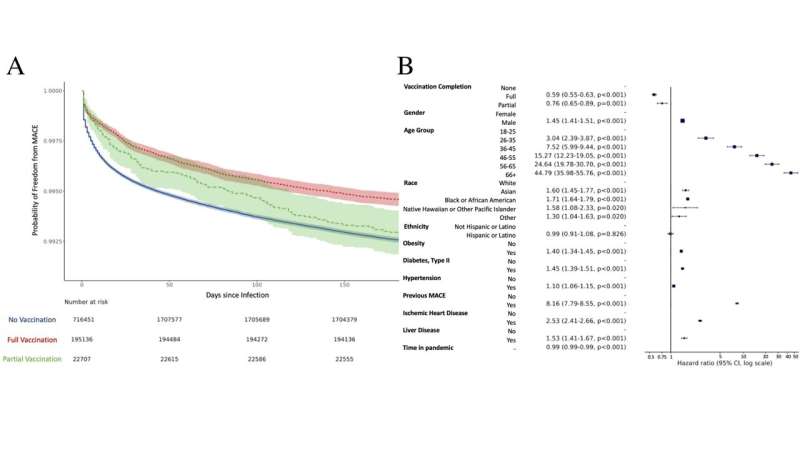This article has been reviewed according to Science X's editorial process and policies. Editors have highlighted the following attributes while ensuring the content's credibility:
fact-checked
peer-reviewed publication
trusted source
proofread
COVID-19 vaccination linked to fewer cardiac events

Analyzing the most extensive datasets in the United States, researchers from the Icahn School of Medicine at Mount Sinai have revealed that vaccination against COVID-19 is associated with fewer heart attacks, strokes, and other cardiovascular issues among people who were infected with SARS-CoV-2, the virus that causes COVID-19.
The research letter, "Impact of Vaccination on Major Adverse Cardiovascular Events in Patients with COVID-19 Infection," was published in the Journal of the American College of Cardiology on February 20.
In addition, the research will be presented in a poster session in New Orleans at the American College of Cardiology's 72nd Annual Scientific Session together with the World Heart Federation's World Congress of Cardiology.
It is the first study to examine both full and partial vaccination and the link to major adverse cardiac events (MACE) in the United States, confirming similar analyses performed previously using the Korean COVID-19 registry. Researchers used the National COVID Cohort Collaborative (N3C) database, the largest national comprehensive database on COVID-19.
Since its inception in 2020, the N3C has continuously collected and harmonized data from electronic health records of institutions across the country. Included in this study were 1,934,294 patients, 217,843 of whom received mRNA vaccine formulations by Pfizer-BioNTech or Moderna or viral vector technology by Johnson & Johnson. Cox proportional hazards, a statistical technique, was implemented to assess vaccination association with MACE.
"We sought to clarify the impact of previous vaccination on cardiovascular events among people who develop COVID-19 and found that, particularly among those with comorbidities, such as previous MACE, type 2 diabetes, high cholesterol, liver disease, and obesity, there is an association with a lower risk of complications. While we cannot attribute causality, it is supportive evidence that vaccination may have beneficial effects on a variety of post-COVID-19 complications," said senior author Girish N. Nadkarni, MD, MPH, Irene and Dr. Arthur M. Fishberg Professor of Medicine at Icahn Mount Sinai, Director of The Charles Bronfman Institute of Personalized Medicine, and System Chief, Division of Data Driven and Digital Medicine (D3M), Department of Medicine.
"To our surprise, even partial vaccination was associated with lower risk of adverse cardiovascular events," said first study author Joy Jiang, an MD/Ph.D. candidate in the lab of Dr. Nadkarni. "Given the magnitude of SARS-CoV-2 infection worldwide, we hope our findings could help improve vaccination rates, especially in individuals with coexisting conditions."
Further work will be necessary to elucidate the mechanisms involved from an immunological perspective and clarify the role of SARS-CoV-2 subtypes and reinfections in their relationship to the risk of MACE.
More information: Joy Jiang et al, Impact of Vaccination on Major Adverse Cardiovascular Events in Patients With COVID-19 Infection, Journal of the American College of Cardiology (2023). DOI: 10.1016/j.jacc.2022.12.006





















